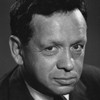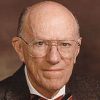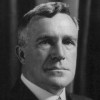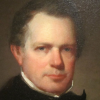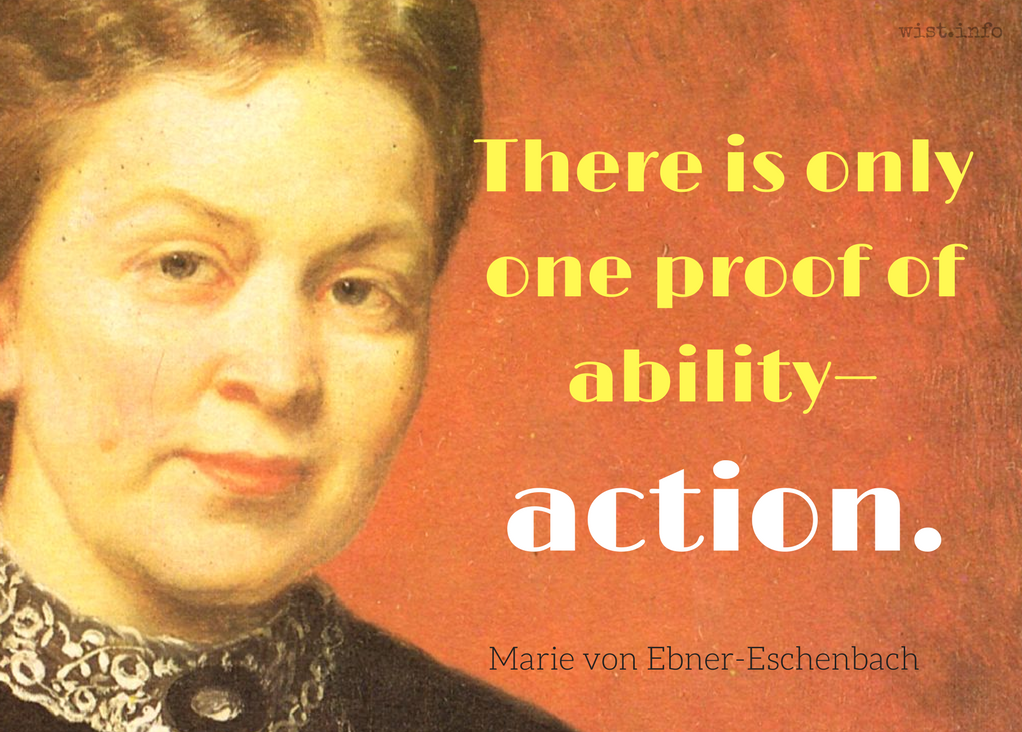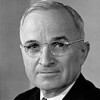Sex gives us a glimpse of a concentration of the mind that would make us godlike if we could command it in other spheres.
Colin Wilson (1931-2013) English existentialist philosopher, novelist
The God of the Labyrinth [The Hedonists] (1970)
(Source)
Quotations about:
potential
Note not all quotations have been tagged, so Search may find additional quotes on this topic.
Focusing your life solely on making a buck shows a certain poverty of ambition. It asks too little of yourself. You need to take up the challenges that we face as a nation and make them your own. Not because you have a debt to those who helped you get here, although you do have that debt. Not because you have an obligation to those who are less fortunate than you, although I do think you do have that obligation. It’s primarily because you have an obligation to yourself. Because individual salvation has always depended on collective salvation. Because it’s only when you hitch your wagon to something larger than yourself that you realize your true potential.
Barack Obama (b. 1961) American politician, US President (2009-2017)
Speech (2005-06-04), Commencement, Knox College, Galesburg, Illinois
(Source)
This man through all his new life, fresh and young,
in virtual power was one who might have proved,
in all of his behaviour, wonderful.
Yet there, on earth, the richer soil may be,
the more — untilled or sown with evil seed —
its vigour turns to wilderness and bane.[Questi fu tal ne la sua vita nova
virtüalmente, ch’ogne abito destro
fatto averebbe in lui mirabil prova.
Ma tanto più maligno e più silvestro
si fa ’l terren col mal seme e non cólto,
quant’elli ha più di buon vigor terrestro.]Dante Alighieri (1265-1321) Italian poet
The Divine Comedy [Divina Commedia], Book 2 “Purgatorio,” Canto 30, l. 115ff (3.115-120) [Beatrice] (1314) [tr. Kirkpatrick (2007)]
(Source)
Beatrice, speaking of Dante.
(Source (Italian)). Alternate translations:
Such genuine worth adorn'd his early days,
That each prolific stem of heav'nly Grace
In that rich Mould a genuine footing found:
But, oh! the rankest soil but serves to feed
The plant of juice malign, and noxious weed.
If Culture's hand neglect the hapless ground.
[tr. Boyd (1802), st. 26]
This man
Was in the freshness of his being, such,
So gifted virtually, that in him
All better habits wond’rously had thriv’d.
The more of kindly strength is in the soil,
So much doth evil seed and lack of culture
Mar it the more, and make it run to wildness.
[tr. Cary (1814)]
This man was such, in his new being found,
Of virtuous kind, that every nobler way
In him gave proof of wonderful essay;
So much the more malignant, wild the soil
Of earth with evil seed, untilled with toil,
The more good vigour and terrestrial oil.
[tr. Bannerman (1850)]
Such had this man become in his new life
Potentially, that every righteous habit
Would have made admirable proof in him;
But so much more malignant and more savage
Becomes the land untilled and with bad seed,
The more good earthly vigour it possesses.
[tr. Longfellow (1867)]
This man was such in his new life, potentially, that every right habit would have wrought in him a wondrous result. But all the more malign and the more wild becomes the ground with bad seed and uncultivated, in proportion as it has from the soil more of good force.
[tr. Butler (1885)]
This one was such in new life's opening hour
Fitted for good, that every virtuous growth
Had made in him miraculous proof of power.
But so much more malign and tangled groweth,
With poisonous wilding seeds, the uncultured sward,
As of terrestrial strength the more it show.
[tr. Minchin (1885)]
This man was such in his new life, virtually, that every right habit would have made admirable proof in him. But so much the more malign and more savage becomes the land ill-sown and untilled, as it has more of good terrestrial vigor.
[tr. Norton (1892)]
This man was such in his new life potentially, that every good talent would have made wondrous increase in him.
But so much the more rank and wild the ground becomes with evil seed and untilled, the more it hath of good strength of soil.
[tr. Okey (1901)]
This man in his early life was such potentially that every right disposition would have come to marvelous proof in him; but so much the more noxious and wild the ground becomes, with bad seed and untilled, as it has more good strength of soil.
[tr. Sinclair (1939)]
This man was such in natural potency,
In his new life, that all the ingrained good
Looked in him to have fruited wonderously.
But so much groweth the more rank and rude
The soil with bad seed and unhusbanded,
The more it hath from earth of hardihood.
[tr. Binyon (1943)]
[...] had so endowed this man, potentially,
In his new life, that from such gifts as those
A wondrous harvest would have come to be.
But so much ranker, weedier, and more gross
Runs the untended field where wild tares seed,
As the good soil is rich and vigorous.
[tr. Sayers (1955)]
This man, potentially, was so endowed
from early youth that marvelous increase
should have come from every good he sowed.
But richest soil the soonest will grow wild
with bad seed and neglect.
[tr. Ciardi (1961)]
This man was such in his new life, virtually, that every right disposition would have made marvelous proof in him. But so much the more rank and wild becomes the land, ill-sown and untilled, as it has more of good strength of soil.
[tr. Singleton (1973)]
[...] was this man so endowed, potentially,
in early youth -- had he allowed his gifts
to bloom, he would have reaped abundantly.
But the more vigorous and rich the soil,
the wilder and weedier it grows
when left untilled, its bad seeds flourishing.
[tr. Musa (1981)]
This man, in his youthful years, had such
Possibilities, that every propitious tendency
Would have produced some marvelous result in him.
But ground sown with bad seed and not cultivated
Becomes the more malignant and overgrown
The more wholesome vigour there is in the soil.
[tr. Sisson (1981)]
He
when young, was such -- potentially -- that any
propensity innate in him would have
prodigiously succeeded, had he acted.
But where the soil has finer vigor, there
precisely -- when untilled or badly seeded --
will that terrain grow wilder and more noxious.
[tr. Mandelbaum (1982)]
This man, potentially, was such in his vita nuova, his new life, that every true skill would have grown miraculously in him. But the more good qualities the earth’s soil has, the more wild and coarse it becomes with evil seed, and lack of cultivation.
[tr. Kline (2002)]
He was such in his new life, potentially, that every good habit would have produced a marvelous result in him.
But all the more malignant and wild becomes the soil with bad seed and without cultivation, the more it has in it of good earthly vigor.
[tr. Durling (2003)]
This man in his new life potentially was such
that each good disposition in him
would have come to marvelous conclusion,
but the richer and more vigorous the soil,
when planted ill and left to go to seed,
the wilder and more noxious it becomes.
[tr. Hollander/Hollander (2007)]
And one such was this man's new life on earth,
So all good inclinations, all predictions,
Should wonderfully be proved in the life he lives.
Yet land improperly sown, and never tilled,
But blessed with soil of enormous power and strength,
Will turn itself more terribly rank and foul.
[tr. Raffel (2010)]
Beauty is the purgation of superfluities.
Michelangelo (1475-1564) Italian artist, architect, poet [Michelangelo di Lodovico Buonarroti Simoni]
(Attributed)
This phrase is widely attributed to Michelangelo and, often noted as being from a letter to Rene Lui Descartes XIV (1540-03-06). But a search of several books of Michelangelo's letters finds no such letter with parts of that name or with that text.
The letter is almost always noted as being quoted in George Augustus Lofton, Character Sketches (1890). But the reference there merely gives the words of the quote; it says nothing about a letter, let alone a date or to whom it is sent.
The phrase, when rendered into Italian (la bellezza è la purificazione del superfluo or la bellezza è l'eliminazione del superfluo) can be found attributed to Michelangelo, but without citation.
That said, the phrase lines up with many other quotes attributed to Michelangelo, to the effect that statues consist of a figure "trapped" in marble (or whatever the medium), to be revealed by removing just enough stone but no more. E.g.,
Each block of stone has a statue inside it and it is the sculptor's job to discover it.
[Ogni blocco di pietra ha una statua dentro di sé ed è compito dello scultore scoprirla.]
(Source)
Nothing the best of artists can conceive
but lies, potential, in a block of stone,
superfluous matter round it. The hand alone
can free it that has intelligence for guide.
[Non ha l’ottimo artista alcun concetto
ch’un marmo solo in sé non circonscriva
col suo superchio, e solo a quello arriva
la man che ubbidisce all’intelletto.]
(Poem, tr. Nims (1998))
‘Tis the Glory and Merit of some men to write well, and of others not to write at all.
[La gloire ou le mérite de certains hommes est de bien écrire; et de quelques autres, c’est de n’écrire point.]Jean de La Bruyère (1645-1696) French essayist, moralist
The Characters [Les Caractères], ch. 1 “Of Works of the Mind [Des Ouvrages de l’Esprit],” § 59 (1.59) (1688) [Bullord ed. (1696)]
(Source)
(Source (French)). Alternate translations:
'Tis the Glory or the Merit of some Men to write well; and of others not to write at all.
[Curll ed. (1713)]
It is the Glory and Merit of some Men to write well, and of others not to write at all.
[Browne ed. (1752)]
It is the glory and the merit of some men to write well, and of others not to write at all.
[tr. Van Laun (1885)]
The glory or merit of certain men lies in writing well: that of certain others, in not writing at all.
[tr. Stewart (1970)]
The young should have our respect. How do we know that the coming generation may not prove to be the equal of the present one?
[後生可畏、焉知來者之不如今也]
Confucius (c. 551- c. 479 BC) Chinese philosopher, sage, politician [孔夫子 (Kǒng Fūzǐ, K'ung Fu-tzu, K'ung Fu Tse), 孔子 (Kǒngzǐ, Chungni), 孔丘 (Kǒng Qiū, K'ung Ch'iu)]
The Analects [論語, 论语, Lúnyǔ], Book 9, verse 23 (9.23) (6th C. BC – AD 3rd C.) [tr. Annping Chin (2014)]
(Source)
Originally numbered by Legge as v. 22. The numbering by translator is shown below. (Source (Chinese)). Alternate translations:
A youth is to be regarded with respect. How do we know that his future will not be equal to our present?
[tr. Legge (1861), 9.22]
Reverent regard is due to youth. How know we what difference there may be in them in the future from what they are now?
[tr. Jennings (1895), 9.22]
Youths should be respected. How do we know that their future will not be as good as we are now?
[tr. Ku Hung-Ming (1898), 9.22]
The young should inspire one with respect. How do we know that their future will not equal our present?
[tr. Soothill (1910), 9.22]
You can respect ’em soon after birth, how can one know what will come up to present record?
[tr. Pound (1933), 9.22]
Respect the young. How do you know that they will not one day be all that you are now?
[tr. Waley (1938), 9.22]
Juniors are to be respected. How do we know that in future they will not be our equals?
[tr. Ware (1950), 9.23]
It is fitting that we should hold the young in awe. How do we know that the generations to come will not be the equal of the present?
[tr. Lau (1979), 9.23]
The young should be revered, for how does one know that what is to come will not be as good as the present?
[tr. Dawson (1993), 9.23]
One should regard the young with awe: how do you know that the next generation will not equal the present one?
[tr. Leys (1997), 9.23]
Young people are awe-inspiring. How do we know that in the future, they will not be so awe-inspiring as they are today?
[tr. Huang (1997), 9.23]
The next generation could be feared, how do you know the future is not better than the now.
[tr. Cai/Yu (1998), 9.23, No. 232]
The young should be held in high esteem. After all, how do we know that those yet to come will not surpass our contemporaries?
[tr. Ames/Rosemont (1998), 9.23]
The young are to be held in awe. How do we know that what is to come will not surpass the present?
[tr. Brooks/Brooks (1998), 9.23]
Hold the young in awe. How can we know their generation will not equal our own?
[tr. Hinton (1998), 9.23]
We should look upon the younger generation with awe because how are we to know that those who come after us will not prove our equals?
[tr. Slingerton (2003), 9.23]
Respect those younger than yourself. How do you know that the coming generation may not prove as good as our present one?
[tr. Watson (2007), 9.23]
We should feel threatened by young people because they might supersede us.
[tr. Li (2020), 9.23]
KEATING: Now I would like you to step forward over here and peruse some of the faces from the past. You’ve walked past them many times. I don’t think you’ve really looked at them. They’re not that different from you, are they? Same haircuts. Full of hormones, just like you. Invincible, just like you feel. The world is their oyster. They believe they’re destined for great things, just like many of you. Their eyes are full of hope, just like you.
Did they wait until it was too late to make from their lives even one iota of what they were capable? Because, you see gentlemen, these boys are now fertilizing daffodils. But if you listen real close, you can hear them whisper their legacy to you. Go on, lean in. Listen, you hear it?
Carpe. Carpe diem. Seize the day, boys, make your lives extraordinary.
I felt it myself. The glitter of nuclear weapons. It is irresistible if you come to them as a scientist. To feel it’s there in your hands, to release this energy that fuels the stars, to let it do your bidding. To perform these miracles, to lift a million tons of rock into the sky. It is something that gives people an illusion of illimitable power, and it is, in some ways, responsible for all our troubles — this, what you might call technical arrogance, that overcomes people when they see what they can do with their minds.
Yet, if nothing else, each time a new baby is born there is a possibility of reprieve. Each child is a new being, a potential prophet, a new spiritual prince, a new spark of light precipitated into the outer darkness. Who are we to decide that it is hopeless?
R. D. Laing (1927-1989) Scottish psychiatrist [Ronald David Laing]
The Politics of Experience, ch. 1 (1967)
(Source)
I have believed that we are neither angels nor devils, but humans, with clusters of potentials in both directions. I am neither an optimist nor pessimist, but a possibilist.
Maxwell "Max" Lerner (1902-1992) American journalist, columnist, educator
Who’s Who in America, “Max Lerner”
Summary of his beliefs recorded in his Who's Who entry. Quoted in "Max Lerner, Writer, 89, Is Dead; Humanist on Political Barricades," New York Times (6 Jun 1992).
Love unlocks doors and opens windows that weren’t even there before.
Mignon McLaughlin (1913-1983) American journalist and author
The Second Neurotic’s Notebook, ch. 1 (1966)
(Source)
We are all such a waste of our potential, like three-way lamps using one-way bulbs.
Mignon McLaughlin (1913-1983) American journalist and author
The Neurotic’s Notebook, ch. 5 (1963)
(Source)
To think yourself incapable of crime is one failure of the imagination. To think yourself capable of all crimes is another.
James Richardson (b. 1950) American poet
Vectors: Aphorisms and Ten-Second Essays, #122 (2001)
(Source)
As a field, though fertile, cannot yield a harvest without cultivation, no more can the mind without learning.
[Ut ager quamvis fertilis sine cultura fructuosus esse non potest, sic sine doctrina animus.]
Marcus Tullius Cicero (106-43 BC) Roman orator, statesman, philosopher
Tusculan Disputations [Tusculanae Disputationes], Book 2, ch. 5 (2.5) / sec. 13 [Marcus] (45 BC) [tr. Peabody (1886)]
(Source)
Often rendered in reverse order: "A mind without instruction can no more bear fruit than can a field, however fertile, without cultivation." (e.g., 1906). Original Latin. Alternate translations:
As a Field, though it be Fruitful, without Tillage cannot bring a good Crop, so the Soul without Learning.
[tr. Wase (1643)]
As the field naturally fruitful cannot produce a crop, without dressing, so neither can the mind, without improvement.
[tr. Main (1824)]
As the field, however fertile, cannot be fruitful without culture, so with the mind, without learning.
[tr. Otis (1839)]
As a field, although it may be naturally fruitful cannot produce a crop, without dressing, so neither can the mind, without education.
[tr. Yonge (1853)]
Just as a field however fertile cannot be fruitful without cultivation, neither can the soul without instruction.
[tr. Douglas (1990)]
Just as a field, however fertile, cannot be productive without cultivation, so the soul cannot be without teaching.
[tr. Davie (2017)]
The difficult is what takes a little time; the impossible is what takes a little longer.
Fridtjof Nansen (1861-1930) Norwegian explorer, scientist, diplomat, humanitarian
Quoted in Listener (14 Dec 1939)
(Source)
If you are what you ought to be, you will set fire to all Italy, and not only yonder.
[Se sarete quello che dovete essere, metterete fuoco in tutta Italia, non tanto costì.]
Catherine of Siena (1347-1380) Italian Catholic mystic, activist, author
Letter 368 to Stefano Maconi
(Source)
Alt. trans.:Original Italian.
- "Be who God meant you to be and you will set the world on fire." [Quoted by Bishop Richard Chartres, sermon, Royal Wedding, Westminster Abbey (29 Apr 2011)]
- "If you are what you should be, you will set the whole world ablaze!" [Quoted by Pope John Paul II, Closing Homily at World Youth Day, Tor Vergata (20 Aug 2000)]
- "If you are what you should be, you will set the world on fire."
- "Become who God intended you to be and you will set the world on fire."
- "If you are what you should be, you will set the whole world on fire!"
To believe that man’s aggressiveness or territoriality is in the nature of the beast is to mistake some men for all men, contemporary society for all possible societies, and, by a remarkable transformation, to justify what is as what needs must be; social repression becomes a response to, rather than a cause of, human violence.
Leon Eisenberg (1922-2009) American psychiatrist and medical educator
“The Human Nature of Human Nature,” Science (14 Apr 1972)
(Source)
Based on an address at Faculty of Medicine Day, McGill University Sesquicentennial Celebration, Montreal, Canada (1 Oct 1971).
Be fit for more than the thing you are now doing. Let everyone know that you have a reserve in yourself, — that you have more power than you are now using. If you are not too large for the place you occupy, you are too small for it.
James A. Garfield (1831-1881) US President (1881), lawyer, lay preacher, educator
“Elements of Success,” speech at Spencerian Business College, Washington, DC (29 Jun 1869)
(Source)
Reprinted in in B. A. Hinsdale, ed., President Garfield and Education: Hiram College Memorial, ch. 8 (1882).
Every fellow is really two men — what he is and what he might be; and you’re never absolutely sure which you’re going to bury till he’s dead.
George Horace Lorimer (1867-1937) American journalist, author, magazine editor
Old Gorgon Graham: More Letters from a Self-Made Merchant to His Son, ch. 12 (1904)
(Source)
A babe is nothing but a bundle of possibilities.
Henry Ward Beecher (1813-1887) American clergyman and orator
Proverbs from Plymouth Pulpit, “Children” (1887) [ed. William Drysdale]
(Source)
He who would acquire fame must not show himself afraid of censure. The dread of censure is the death of genius.
William G. Simms (1806-1870) American writer and politician
Egeria, Or Voices of Thought and Counsel, for the Woods and Wayside, “Ambition” (1853)
(Source)
Most men resemble great deserted palaces: the owner occupies only a few rooms and has closed-off wings where he never ventures.
[Presque tous les hommes ressemblent à ces grands palais déserts dont le propriétaire n’habite que quelques pièces; et il ne pénètre jamais dans les ailes condamnées.]
To do the work that you are capable of doing is the mark of maturity.
Most of us stand poised at the edge of brilliance, haunted by the knowledge of our proximity, yet still demonstrably on the wrong side of the line, our dealings with reality undermined by a range of minor yet critical psychological flaws (a little too much optimism, an unprocessed rebelliousness, a fatal impatience or sentimentality). We are like an exquisite high-speed aircraft which for lack of a tiny part is left stranded beside the runway, rendered slower than a tractor or bicycle.
Alain de Botton (b. 1969) Swiss-British author
The Pleasures and Sorrows of Work, ch. 4 (2009)
(Source)
Well-married, a man is winged — ill-matched, he is shackled.
Henry Ward Beecher (1813-1887) American clergyman and orator
Norwood; or, Village Life in New England, Vol. 1, ch. 6 (1867)
(Source)
Later requoted in Proverbs from Plymouth Pulpit, ch. 17 "The Family" (1887).
There is only one proof of ability — action.
[Für das Können gibt es nur einen Beweis: das Tun.]
Marie von Ebner-Eschenbach (1830-1916) Austrian writer
Aphorisms [Aphorismen], No. 91 (1880) [tr. Wister (1883)]
(Source)
(Source (German)). Alternate translation:
There is only one proof of ability: doing it.
[tr. Scrase/Mieder (1994)]
Listen to the MUSTN’Ts, child,
Listen to the DON’Ts
Listen to the SHOULDN’Ts
The IMPOSSIBLES, the WON’Ts
Listen to the NEVER HAVEs
Then listen close to me —
Anything can happen, child,
ANYTHING can be.
And now let us believe in a long year that is given to us, new, untouched, full of things that have never been, full of work that has never been done, full of tasks, claims, and demands; and let us see that we learn to take it without letting fall too much of what it has to bestow upon those who demand of it necessary, serious, and great things.
Rainer Maria Rilke (1875-1963) German poet
Letter to Clara Rilke (1 Jan 1907)
(Source)
Usually paraphrased: "And now we welcome the new year. Full of things that have never been."
Although men are accused of not knowing their own weakness, yet perhaps as few know their own strength. It is in men as in soils, where sometimes there is a vein of gold, which the owner knows not of.
Jonathan Swift (1667-1745) English writer and churchman
“Thoughts on Various Subjects” (1706)
(Source)
The education of our people should be a lifelong process by which we continue to feed new vigor into the lifestream of the Nation through intelligent, reasoned decisions. Let us not think of education only in terms of its costs, but rather in terms of the infinite potential of the human mind that can be realized through education. Let us think of education as the means of developing our greatest abilities, because in each of us there is a private hope and dream which, fulfilled, can be translated into benefit for everyone and greater strength for our Nation.
John F. Kennedy (1917-1963) US President (1961-63)
“Proclamation 3422 – American Education Week, 1961” (25 Jul 1961)
(Source)
The real “haves” are they who can acquire freedom, self-confidence, and even riches without depriving others of them. They acquire all of these by developing and applying their potentialities. On the other hand, the real “have nots” are those who cannot have aught except by depriving others of it. They can feel free only by diminishing the freedom of others, self-confident by spreading fear and dependence among others, and rich by making others poor.
Eric Hoffer (1902-1983) American writer, philosopher, longshoreman
The Passionate State of Mind, Aphorism 115 (1955)
(Source)
Even in the most wretched being there is a tiny hook on which a thread of salvation could be fastened.
Marie von Ebner-Eschenbach (1830-1916) Austrian writer
Aphorisms [Aphorismen] (1880) [tr. Scrase and Mieder (1994)]
(Source)
We are not powerless. We have tremendous potential for good or ill. How we choose to use that power is up to us; but first we must choose to use it. We’re told every day, “You can’t change the world.” But the world is changing every day. Only question is … who’s doing it? You or somebody else?
J. Michael (Joe) Straczynski (b. 1954) American screenwriter, producer, author [a/k/a "JMS"]
rec.arts.sf.tv.babylon5.moderated, “At The Midpoint (Spoilers for everything)” (7 Apr 1995)
(Source)
See Straczynski.
POET: The fire i’the flint
Shows not till it be struck.William Shakespeare (1564-1616) English dramatist and poet
Timon of Athens, Act 1, sc. 1, l. 28ff (1.1.28-29) (1606) [with Thomas Middleton]
(Source)
It is amazing what you can accomplish if you do not care who gets the credit.
Harry S Truman (1884-1972) US President (1945-1953)
(Spurious)
There is nothing contemporary to Truman indicating this is a valid quotation of his. The earliest instance of crediting Truman seems to be by Hugh Sidey in Time (7 Nov 1988).
A variant of this quote was also attributed to Ronald Reagan, apparently due to a plaque he kept in his office:
There is no limit to what a man can do or where he can go if he does not mind who gets the credit.
More discussion of the quote and its actual origins going back to 1863: A Man May Do an Immense Deal of Good, If He Does Not Care Who Gets the Credit – Quote Investigator. See also Montague.
Life shrinks or expands in proportion to one’s courage.
Anaïs Nin (1903-1977) Catalan-Cuban-French author, diarist
Diary (1941-06)
(Source)
In her Diaries [ed. Stuhlmann (1969)].
Do not permit what you cannot do to interfere with what you can do.
John Wooden (1910-2010) American basketball player and coach
Coach Wooden One-on-One, “Day 25” (2003) [with Jay Carty]
(Source)
Variant: "Do not let what you cannot do interfere with what you can do."
OPHELIA: Lord, we know what we are but know not what we may be.
William Shakespeare (1564-1616) English dramatist and poet
Hamlet, Act 4, sc. 5, l. 48ff (4.5.48-49) (c. 1600)
(Source)
Because your own strength is unequal to the task, do not assume that it is beyond the powers of man; but if anything is within the powers and province of man, believe that it is within your own compass also.
[Μή, εἴ τι αὐτῷ σοὶ δυσκαταπόνητον, τοῦτο ἀνθρώπῳ ἀδύνατον ὑπολαμβάνειν, ἀλλ̓ εἴ τι ἀνθρώπῳ δυνατὸν καὶ οἰκεῖον, τοῦτο καὶ σεαυτῷ ἐφικτὸν νόμιζε.]
Marcus Aurelius (AD 121-180) Roman emperor (161-180), Stoic philosopher
Meditations, Book 6, #19 [tr. Rendall (1901 ed.)]
(Source)
Original Greek. Alternate translations:
- "Do not ever conceive anything impossible to man, which by thee cannot, or not without much difficulty be effected; but whatsoever in general thou canst Conceive possible and proper unto any man, think that very possible unto thee also." [tr. Casaubon (1634), #18]
- "Because you find a Thing very difficult, don't presently conclude that no Man can master it. But whatever you observe proper, and practicable by Another, believe likewise within your own power." [tr. Collier (1701)]
- "If a thing is difficult to be accomplished by thyself, do not think that it is impossible for man: but if anything is possible for man and conformable to his nature, think that this can be attained by thyself too." [tr. Long (1862)]
- "Because you find a thing very difficult, do not at once conclude that no man can master it. But whatever you observe proper and practicable by another, believe likewise within your power." [tr. Zimmern (1887)]
- "Do not think that what is hard for thee to master is impossible for man; but if a thing is possible and proper to man, deem it attainable by thee." [tr. Morgan, in Bartlett's Familiar Quotations (1894)]
- "Because thou findest a thing difficult for thyself to accomplish do not conceive it to be impracticable for others; but whatever is possible for a man and in keeping with his nature consider also attainable by thyself." [tr. Haines (1916)]
- "Do not because a thing is hard for you yourself to accomplish, imagine that it is humanly impossible: but if a thing is humanly possible and appropriate, consider it also to be within your own reach." [tr. Farquharson (1944)]
- "Because a thing is difficult for you, do not therefore suppose it to be beyond mortal power. On the contrary, if anything is possible and proper for men to do, assume that it must fall within your own capacity." [tr. Staniforth (1964)]
- "Not to assume it's impossible because you find it hard. But to recognize that if it's humanly possible, you can do it too." [tr. Hays (2003)]
- "If something is difficult for you to accomplish, do not then think it impossible for any human being; rather, if it is humanly possible and corresponds to human nature, know that it is attainable by you as well." [tr. Needleman/Piazza (2008)]
Speaking of Yen Hui, the Master said: “How sad — to watch him forge ahead so resolutely, and never see how far he could go.”
[子謂顏淵曰、惜乎、吾見其進也、未見其止也。]
Confucius (c. 551- c. 479 BC) Chinese philosopher, sage, politician [孔夫子 (Kǒng Fūzǐ, K'ung Fu-tzu, K'ung Fu Tse), 孔子 (Kǒngzǐ, Chungni), 孔丘 (Kǒng Qiū, K'ung Ch'iu)]
The Analects [論語, 论语, Lúnyǔ], Book 9, verse 21 (9.21) (6th C. BC – AD 3rd C.) [tr. Hinton (1998)]
(Source)
Regarding his finest student, who died young. Probable origin of a phrase frequently attributed to Confucius: "It does not matter how slowly you go so long as you do not stop."
Earlier sources use Legge's numbering of 9.20, as noted. (Source (Chinese)). Alternate translations:
The Master said of Yen Yuan, "Alas! I saw his constant advance. I never saw him stop in his progress."
[tr. Legge (1861), 9.20]
"Alas for Hwúi! I saw him (ever) making progress. I never saw him stopping short."
[tr. Jennings (1895), 9.20]
Confucius remarked of the same disciple [Yen Hui]: "Alas! he is dead. I have observed his constant advance; I never saw him stop in his progress."
[tr. Ku Hung-Ming (1898), 9.20]
The Master, referring to Yen Yüan, said: "Alas! I ever saw him make progress, and never saw him stand still."
[tr. Soothill (1910), 9.20]
He described Yen Yuan: Alas, I see him advance, I never see him stop (take a position).
[tr. Pound (1933), 9.20]
The Master said of Yen Hui, Alas, I saw him go forward, but had no chance to see whither this progress would have led him in the end.
[tr. Waley (1938), 9.20]
What a pity that Yen Hui is gone! I saw him make progress, but I never found out what his limit was.
[tr. Ware (1950)]
Alas! I only saw him advance and never saw him stop.
[tr. Huang (1997)]
The Master said of Yen Yūan, "I watched him making progress, but I did not see him realize his capacity to the full. What a pity!"
[tr. Lau (1979)]
The master said of Yan Hui: "Alas! I saw that he was making progress, but I never saw that he was stopping."
[tr. Dawson (1993)]
The Master said of Yan Hui: "Alas, I watched his progress, but did not see him reach the goal."
[tr. Leys (1997)]
The master, speaking of Yan Yuan, said: "Alas! I only saw him advance and never saw him stop."
[tr. Huang (1997)]
Confucius talked about Yuan Yan, said: "What regrettable it is! I just saw that he kept going ahead, and never saw that he got any stopping."
[tr. Cai/Yu (1998), #230]
The Master said about Yan Hui, "Such a pity! I only saw his progress; I never saw where he got to."
[tr. Ames/Rosemont (1998)]
The Master said of Yén Hwéi, Alas! I saw him start, but I did not see him finish.
[tr. Brooks/Brooks (1998)]
The Master said of Yan Hui, “Alas! I watched his advance, and never once saw him stop.”
[tr. Slingerland (2003)]
Speaking of Yan Yuan, the Master said, What a pity! I saw him move forward. I never saw him come to a stop.
[tr. Watson (2007)]
The Master, referring to Yan Hui, said, "It is a pity! I saw him moving forward but did not see him complete his journey."
[tr. Chin (2014)]
Confucius said of Yan Yuan, "Impressive indeed! I always see his progress and have never noticed his pause."
[tr. Li (2020)]










